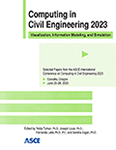Practitioners’ and Instructors’ Considerations in Workforce Development Collaborations: Inputs for Graphical User Interface of a Technology-Driven Matching Platform
Publication: Computing in Civil Engineering 2023
ABSTRACT
The need to prepare students for the workplace, shortage of skilled labor, and fast-paced changes in the industry necessitate improvements in the pedagogical frameworks of educational communities. Practitioners are required to provide practical insights, rigor, and realism to complement academia pedagogic efforts in construction education. However, this is being plagued by several complexities. Leveraging advances in computational techniques, this paper presents the considerations of practitioners and instructors in workforce development collaborations as inputs for a graphical user interface of a technology-driven matching platform for connecting professional and educational communities. Practitioners’ considerations are students and specific course-support related, while instructors’ considerations are related to practitioner suitability, project, and company characteristics. The study contributes to human factors principles in user interface design as well as user-centered design principles by highlighting information requirements of a collaborative network of instructors and practitioners. The findings of this study also provide insights to enhance industry-academia collaborations.
Get full access to this article
View all available purchase options and get full access to this chapter.
REFERENCES
Abudayyeh, O., Russell, J., Johnston, D., and Rowings, J. (2000). “Construction engineering and management undergraduate education”. Journal of construction engineering and management, 126(3), 169–175.
Adabre, M. A., and Chan, A. P. C. (2019). “Critical success factors (CSFs) for sustainable affordable housing”. Building and Environment, 156, 203–214.
Afonso, A., Ramírez, J. J., and Díaz-Puente, J. M. (2012). “University-industry cooperation in the education domain to foster competitiveness and employment”. Procedia-Social and Behavioral Sciences, 46, 3947–3953.
Ahmed, S. M., Yaris, C., Farooqui, R. U., and Saqib, M. (2014). “Key attributes and skills for curriculum improvement for undergraduate construction management programs”. International Journal of Construction Education and Research, 10(4), 240–254.
Ahn, Y. H., Annie, R. P., and Kwon, H. (2012). “Key competencies for US construction graduates: Industry perspective”. Journal of Professional Issues in Engineering Education and Practice, 138(2), 123–130.
Anderson, D., and Mourgues, C. (2014). “Industry participation in construction capstone courses: A company’s experience”. Practice Periodical on Structural Design and Construction, 19(1), 73–76.
Back, W. E., and Sanders, S. R. (1998). “Industry expectations for engineering graduates”. Engineering Construction and Architectural Management, 5(2), 137–143.
Bruneel, J., d’Este, P., and Salter, A. (2010). “Investigating the factors that diminish the barriers to university–industry collaboration”. Research policy, 39(7), 858–868.
Chandrasekaran, S., Littlefair, G., and Stojcevski, A. (2015). “Staff and Students Views on Industry-University Collaboration in Engineering”. International journal of advanced corporate learning, 8(2), 13–19.
Christo-Baker, E. A., Sindone, A., and Roper, C. (2017). “Addressing the skills gap: A regional analysis”. The journal of applied business and economics, 19(8), 10–21.
Civjan, S. A. (2020) “Coordinating Field Trips for Design Courses” Paper presented at 2020 ASEE Virtual Annual Conference Content Access, Virtual Online. 10.18260/1-2—34336.
Dalakas, V. (2016) “Turning Guest Speakers’ Visits into Active Learning Opportunities,” Atlantic Marketing Journal, 5(2), 93–100.
Gould, J. D., and Lewis, C. (1985). “Designing for usability: key principles and what designers think”. Communications of the ACM, 28(3), 300–311.
Gunhan, S. (2015). Collaborative learning experience in a construction project site trip. Journal of Professional Issues in Engineering Education and Practice, 141(1), 04014006.
Hartson, R., and Pyla, P. S. (2012). The UX Book: Process and guidelines for ensuring a quality user experience. Elsevier.
Irizarry, J., and Adams, W. (2006). Benefits of industry involvement in construction education. In 2nd Specialty Conference on Leadership and Management in Construction (p. 18–25). https://www.academia.edu/download/30278937/finalproceedings.pdf#page=25 (Feb. 01, 2023).
Kaymaz, K., and Eryiğit, K. Y. (2011). “Determining factors hindering university-industry collaboration: An analysis from the perspective of academicians in the context of entrepreneurial science paradigm”. International Journal of Social Inquiry, 4(1), 185–213.
Lu, R., and Jacobs, F. (2022). “An Innovative Teaching Model: Involvement of Industry Practitioners in the Teaching of Construction Management Curriculum”. In 2022 ASEE Annual Conference & Exposition. <https://peer.asee.org/40578>. (Feb. 01, 2023).
National Academies of Sciences, Engineering, and Medicine. (2016). “Promising practices for strengthening the regional STEM workforce development ecosystem”. National Academies Press. <https://nap.nationalacademies.org/read/21894/chapter/1>(Feb. 01, 2023).
Niedergassel, B., and Leker, J. (2011). “Different dimensions of knowledge in cooperative R&D projects of university scientists”. Technovation, 31(4), 142–150.
Nnaji, C., and Karakhan, A. A. (2020). “Technologies for safety and health management in construction: Current use, implementation benefits and limitations, and adoption barriers”. Journal of Building Engineering, 29, 101212.
Rizvi, I. A., and Aggarwal, A. (2005). “Enhancing student employability: Higher education and workforce development”. In Proceedings of the 9th Quality in Higher Education Seminar, Birmingham, UK. ≤https://www.qualityresearchinternational.com/esecttools/eseconferencepapers/aggarwal.doc≥. (Feb. 01, 2023).
Silverman, D. (2020). Qualitative research. (Ed.). California: SAGE Publishing.
Information & Authors
Information
Published In
History
Published online: Jan 25, 2024
ASCE Technical Topics:
Authors
Metrics & Citations
Metrics
Citations
Download citation
If you have the appropriate software installed, you can download article citation data to the citation manager of your choice. Simply select your manager software from the list below and click Download.
